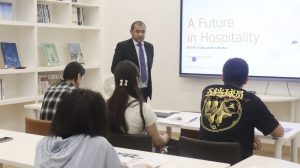IFT’s Tourism and Hotel School has launched a series of Portuguese language courses designed for those working in the hospitality and tourism sectors. The overall aim of the programmes is to support the further development of Macao as a world centre of tourism and leisure, and as a service platform between China and Portuguese-speaking countries.
The courses are being offered in partnership with the Instituto Português do Oriente, also known by its Portuguese acronym IPOR. The latter is a not-for-profit organisation promoting Portuguese culture and language in Macao.
The programmes, each covering an aggregate of 30 hours, comprise: Portuguese for the Hotel Sector; Portuguese for the Food and Beverage Sector; and Portuguese for the Travel and Tourism Sector. The courses are open only to Macao residents, and are free.
Students who successfully complete all 3 courses will be issued an A1-level certificate by IPOR. The certificate is issued under the Common European Framework of Reference for Languages, an international standard for defining language skills. The A1-level certificate recognises a basic ability to communicate and exchange information.
High demand
The Portuguese for the Hotel Sector course made its debut in May. Classes finished at the end of June. IFT initially planned to offer 25 vacancies for the programme, but it had to open a second class, due to very high demand: approximately 250 applications were received.
The course focused on introducing students to the elementary Portuguese vocabulary and grammar needed to perform basic front-of-house operations at a hotel. That included greeting guests and confirming reservation details, and naming and describing hotel and room facilities.
The Portuguese for the Food and Beverage Sector and Portuguese for the Travel and Tourism Sector courses follow a similar approach to the Hotel Sector one. The main aim is to allow students to serve and communicate with clients in Portuguese. In the case of the Portuguese for the Travel and Tourism Sector programme, students will also learn how to name in Portuguese the main monuments and tourism attractions of Macao.
The partnership between IFT and IPOR for Portuguese language teaching began in 1997. Bachelor degree programme students at IFT are required to learn a second language aside from English, and Portuguese is one of the options available. IPOR has been responsible for the design of materials, and delivery of, these Portuguese language courses.
According to a representative from the IFT Tourism and Hotel School, the Institute plans further collaboration with IPOR regarding Portuguese language related projects. The possibility of developing learning materials specific to the hospitality and tourism sectors is one of the areas under discussion.









